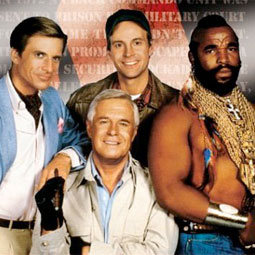Tag: Staff
Do you have happy staff? 5 ways to improve performance [FREE DOWNLOAD]
When you run your own business, one of the most consistent and common causes of sleepless nights is the people you employ. But it...
How do managers MOTIVATE and ENERGISE their people? [FREE DOWNLOAD]
How to keep your people motivated and energetic.
"Short, simple... powerful!"
What is the single most powerful advantage to give your business?
I recently read a report by PwC that said that one in four CEOs are unable to pursue a market opportunity, or have to...
How one business uses three hacks to automate recruitment and hire great talent for...
Everyone needs to find their A-Team. Whether it's using traditional job boards or, using broader communities like Gumtree, there are some nifty tactics that...
Want to motivate staff and influence customers? Just ask a Level 40 Blood Elf....
Dr Jason Fox is an expert in motivation strategy and design, and all things gamification. Dr Fox works with companies all over the world,...
It’s so hard to find good technical talent these days. [VIDEO]
Is a HTML wizard really who you want as a part of your tech team? How about a Javascript ninja or Ruby On Rails rockstar?
What was your most interesting job interview? I bet it wasn’t quite as unpredictable...
Heineken received 1,734 applications for a starter role at the company. Rather than asking the same standard questions and getting mediocre, repetitive answers, the company did something different to identify the right person for the job.
The best ad for a startup job ever?
Jobs within startups generally offer no security, the founder will often have little or no clue about what he or she is doing and the odds of the job description staying the same over a six month period are zero to none. So, how does an aspiring business builder recruit for a startup?
Collabradabra – The magic of collaborating with staff
Yes, it's true, it only takes one budding entrepreneur with a brilliant idea to start a business, but from that point on, it takes a collaboration of staff to turn that business into a success. The only thing more powerful than champion employees, are champion employees that know how to collaborate and work together.
Most Australians are “creative.” At least, according to LinkedIn.
"Creative" topped LinkedIn's list of the most overused buzzwords of 2011, as revealed through a study of members' profiles on the global networking site. "Extensive experience," last year's number-one phrase, was the runner-up this year, with "effective", "track record" and "motivated" claiming spots three through five.
Does Australia’s attitude to customer service stink?
While Australians have come to expect a casual approach to service, visitors aren’t so forgiving. “Having recently been in the USA, the standard of customer service there is great, staff actually want to help you,” says Australian marketing manager Jessica Hannant. “Here the sales assistant doesn't get off the phone to her friend to even serve you at the checkout.” Are things here getting worse?
Do you have ‘who’ it takes? Successful businesses need ‘improvers’ on the payroll.
The gap between what your people are paid and the value they deliver determines people performance and company profit. Do you have who it takes? Andrew Horsfield delivers some hard truths.
When hiring salespeople, make them give you 35 reasons why they want to work...
At sometime during the recruitment process, ask the candidate to write down 35 reasons why they want to be a salesperson within your company. Allow up to 15 minutes for this process alone. I’ve conducted this exercise with hundreds of sales consultants. A common theme is that by the time they reach around the 15th reason they get stuck. Why? Because the first 15 reasons are typically high level and relatively easy to communicate.
Shape up, bosses, or your talent will ship out (and other workplace tips for...
Many Australian companies don’t even provide regular feedback to their staff, let alone have a formal employee development program. This is a costly mistake. As busy managers give less and less time to developing their people, companies are losing the very employees they need to succeed in the long term.
Unfair dismissal laws introduce new definition for ‘small business’ placing more business owners under...
More small businesses now fall under the national government definition of "small businesses", thanks to laws that came into force on 1 January 2011. This means that countless more entrepreneurs will now need to follow federal rules against unfair dismissal. Are you a small business according to the new definition?
Seven ways to reduce overheads (because money doesn’t grow on trees, you know)
Remember when your parents said, “Money doesn't grow on trees” or “A penny saved is a penny earned”? Employees and business owners need to re-visit these old truisms. Carelessness, complacency and failing to ask the right questions of staff and customers has resulted in Australian companies paying dearly in both time and money, according to Catherine DeVrye.
Now even unions can be crowdsourced. But weren’t they always?
The whole concept of a unionism depends on having a 'crowd' and harnessing the power of that crowd to gain collective bargaining power. Therefore, it might seem slightly strange to describe ThePoint's online service, designed to help office workers anonymously organise with their coworkers, as 'crowdsourced unionism'.
People quit managers, not jobs [It’s not them, it’s you]
A study of hospital workers conducted by Chilterns University College in the UK found that nurses working for hospital supervisors with poor management styles had significantly higher blood pressure than nurses working for bosses judged as understanding and considerate. As a result, the nurses with bad bosses had a roughly 20 percent higher risk of heart disease. Are you giving your employees heart attacks?
Equal pay for women? Not likely, Australians say
A new study shows Australians are largely pessimistic about the likelihood of women receiving equal pay to men, though most Australians firmly believe in the idea.
The case of the overstimulating workspace (Why “Nothing jangles a primate like crowding”)
One question – Where do you do your best thinking? – received the most surprising answer. Only around 10% of people responded “at work”. Consider this: people are paid to think, and are required to spend a lot of time at work, yet work is not the place where they think well.


![Do you have happy staff? 5 ways to improve performance [FREE DOWNLOAD]](https://anthillonline.com/wp-content/uploads/2016/06/chris-smith-cheatsheet-04c.pdf-Box-2016-06-30-20-45-20-180x135.png)
![How do managers MOTIVATE and ENERGISE their people? [FREE DOWNLOAD]](https://anthillonline.com/wp-content/uploads/2016/04/3-1680-page-spread-180x135.png)

![Want to motivate staff and influence customers? Just ask a Level 40 Blood Elf. [CHEAT SHEET]](https://anthillonline.com/wp-content/uploads/2013/10/master-magazine-gamification-500x500-180x135.png)
![It’s so hard to find good technical talent these days. [VIDEO] HTML wizard at Vooza](https://anthillonline.com/wp-content/uploads/2013/03/HTMLWizard-180x135.jpg)
![What was your most interesting job interview? I bet it wasn’t quite as unpredictable as this [VIDEO]](https://anthillonline.com/wp-content/uploads/2013/02/HeinekenGuy-180x135.jpg)


![The Alchemy of Negotiation with Matt Lohmeyer [FREE REPORT]](https://anthillonline.com/wp-content/uploads/2015/07/Capture-300x194.jpg)
![The Ultimate Social Media Almanac with James Tuckerman [Cheat Sheet]](https://anthillonline.com/wp-content/uploads/2015/11/Screen-Shot-2015-11-26-at-11.24.55-100x75.png)
![Four principles to creating dedicated customers…or zombie loyalists with Peter Shankman [Free report]](https://anthillonline.com/wp-content/uploads/2015/11/Screen-Shot-2015-11-26-at-11.16.26-100x75.png)
![How to give good headlines, and create emails that get opened [CHEAT SHEET]](https://anthillonline.com/wp-content/uploads/2013/11/7-steps-cheatsheet-3d-cover-nuova--100x75.png)
![Five essential ingredients for a humming homepage with James Tuckerman [FREE REPORT]](https://anthillonline.com/wp-content/uploads/2015/07/homepage-checklist-1680-01-copy-100x75.png)
![Generating Web Traffic with Mark Middo and James Tuckerman [FREE REPORT]](https://anthillonline.com/wp-content/uploads/2015/08/Capture3-100x75.jpg)

![Inbound Marketing Reloaded with James Tuckerman [FREE REPORT]](https://anthillonline.com/wp-content/uploads/2015/07/cover-3d-347h-x-253w--253x194.png)
![How to expand into New Markets with Elsita Meyer-Brandt [CHEAT SHEET]](https://anthillonline.com/wp-content/uploads/2015/07/Screen-Shot-2015-11-26-at-15.52.30-100x75.png)
![Three easy wins when using LinkedIn with David Hobson [FREE REPORT]](https://anthillonline.com/wp-content/uploads/2015/08/3quick-wins-100x75.png)
![Learn how to generate more leads in one month than most competitors would in one year! [FREE REPORT]](https://anthillonline.com/wp-content/uploads/2015/08/Capture4-100x75.jpg)
![Five essential things to get right if you want to raise capital, with Bryan Vadas [FREE CHEAT SHEET]](https://anthillonline.com/wp-content/uploads/2015/08/vadas-3d-cover-01--100x75.png)
![New Zealand’s Xero eyes US IPO, further disruption as subscribers increase [INFOGRAPHIC]](https://anthillonline.com/wp-content/uploads/2014/07/sruuuuujana-212x194.png)
![Ever wonder if your ‘content marketing’ is really just crap? You gotta see this! [INFOGRAPHIC]](https://anthillonline.com/wp-content/uploads/2014/08/content-100x75.jpg)
![7 Business Lessons From Game of Thrones [INFOGRAPHIC]](https://anthillonline.com/wp-content/uploads/2014/10/infographic-games-of-thrones-041-100x75.jpg)
![How to build your own Media Empire… In seven steps with Nathan Chan [INFOGRAPHIC]](https://anthillonline.com/wp-content/uploads/2014/10/Nathan-Chan-Infographic-e1413419529176-100x75.jpg)
![5 Business Lessons From Tinder [INFOGRAPHIC]](https://anthillonline.com/wp-content/uploads/2014/10/Tinder-Elegant-Infographic-100x75.jpg)



